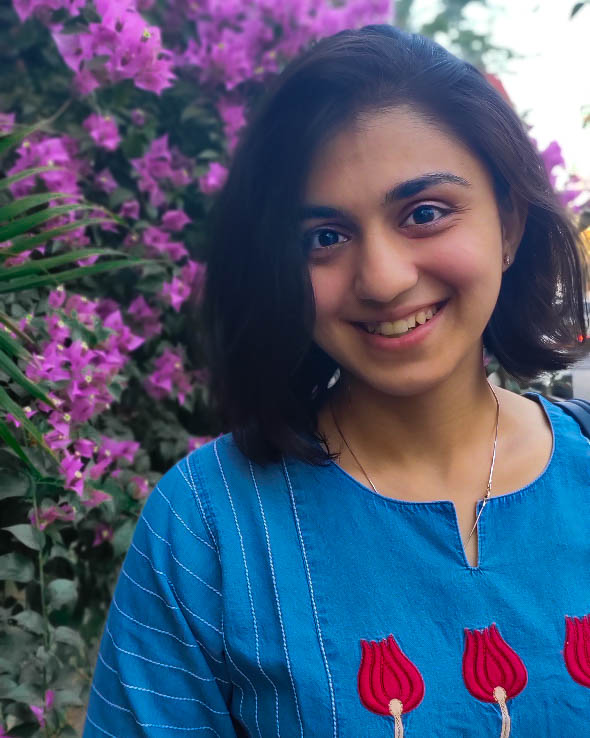
Interviewee: Sailee Pradeep Sakhalkar
Interviewer: Damayanti Dasgupta
This is an Interview with ‘Sailee Pradeep Sakhalkar‘ transcribed by Damyanti Das Gupta & Rishi Kumar together.
Sailee was an Erasmus Mundus Scholar and currently is a Ph.D. student at Charles University, Prague.
She says, “I work on pollination systems with the Insect Community Ecology Group (ICEG). Visit us at www.insect-communities.cz! I’m easily wowed by random snippets from science and like to fool myself into believing that I’m good at writing“
1. How do you go about the process of mailing PIs/prof and realizing your interest in a domain?
Sailee: Look for labs/PIs who work in your interest or whose work interests you and simply approach them by asking them for a spot in their lab and why you want to be there. Figuring out a suitable PI needs intensive searching online and reading through the work description of the lab. Try to get in touch with Ph.D. students or PI of the lab even if they don’t actively advertise positions in the lab. It helps to be specific about your expectations from the lab. One should also write about the project they’re interested in, the skills they have, and those that they want to develop.
Even if that lab doesn’t take you in, they might put you in touch with someone else who can. Also, sometimes working in a lab or on a project may help you realize your interest in that area of research.
2. While working on internships we realize that there are skills like biostatistics or programming etc that research requires but the curriculum doesn’t provide. How do you prepare for these skills because the course doesn’t teach you these?
Sailee: Online resources, videos, and tutorials are of great help. One can also approach the statistics profs in college. Self-learning using online resources is best. Learning these skills is an added asset. It’s not necessary or compulsory for the application but important to know and would give you an advantage in the application.
3. When applying for a Masters’s degree abroad, there are many different options and specializations available, while India usually offers a broad course on Biological Science. How to understand which course is suitable?
Sailee: Get in touch with former students, of course, go through the syllabus and understand what the course covers. This information is usually available online. Doing a specialization is not a problem, but knowing what you’re signing up for is more important.
4. Is it advisable to go for a broader course at the master’s level and then go for specialization, or should you take a specialized course if you’re confident enough?
Sailee: Go for a specialized course if you’re confident enough about your choice and if you are not sure about your specific interest then it’d be better to select a generalized course that will expose you to many topics. Do remember that choosing one topic or another doesn’t bind you to that only.
5. Is there any specific way to prepare for English proficiency tests like IELTS and TOEFL?
Sailee: Depends on one’s fluency and medium of education. Speaking English in daily life may help. Those who are comfortable reading and writing English and have decent communication skills do not need coaching.
6. How did you find the information on scholarships like these?
Sailee: A general Google search for your required course may lead you to eligible scholarships. These sites may help – European Union website, {and others that she mentioned}. One needs to keep an eye on deadlines on their own and start planning early from the second year onwards. Many mailing lists are available for specific universities or courses, which one can join for getting updates.
7. In India we tend to choose colleges based on rankings etc. For colleges abroad, does the same principle apply or do we focus more in the specific lab or PI/ faculty?
Sailee: It is important to be aware of the lab and PI, if possible, be in touch with students of that lab to get a clear idea. But also have a backup plan for a lab in case you do not get that. It’s good to be sure of that entire department in the college/university rather than focusing on only one PI. The concept of ranking universities does not apply to this.
8. How to write an SoP or research proposal? Should we take help from consultants or write on our own?
Sailee: I would not advise involving companies etc. Write the application on your own, and ask peers or professors to check. You will know best what to write about your motivations.
For SoP, focus more on why you want to join that lab and why the lab should want you, how are you suitable. Focus less on your inspiration, and background, because that is for an interview. Explain why you are relevant to the course, brief education background, and work experience. For a research proposal, keep it brief and relevant and express a clear interest in the course. Do not extend your CV in the SoP.
9. Biology has many different specializations and branches. At the UG level, how does one get the necessary work experience or exposure to these specific areas if they want to study it for their master’s because they don’t have the necessary academic background?
Sailee: Labs usually take the UG interns through the basics of their specializations, so that should help them understand the work and get involved in the research. Many summer research programs by eminent institutes also have such options for UG students. These can be a good option to get experience.








1 thought on “FAQs of applying abroad – Sailee Sakhalkar’s Interview”
Can I get a noble prize in physics after mbbs